B cells and CD4+ T cells join forces to activate killer T cells
- A Single US$2.15-Million Injection to Block 90% of Cancer Cell Formation
- WIV: Prevention of New Disease X and Investigation of the Origin of COVID-19
- Why Botulinum Toxin Reigns as One of the Deadliest Poisons?
- FDA Approves Pfizer’s One-Time Gene Therapy for Hemophilia B: $3.5 Million per Dose
- Aspirin: Study Finds Greater Benefits for These Colorectal Cancer Patients
- Cancer Can Occur Without Genetic Mutations?
B cells and CD4+ T cells join forces to activate killer T cells
- Red Yeast Rice Scare Grips Japan: Over 114 Hospitalized and 5 Deaths
- Long COVID Brain Fog: Blood-Brain Barrier Damage and Persistent Inflammation
- FDA has mandated a top-level black box warning for all marketed CAR-T therapies
- Can people with high blood pressure eat peanuts?
- What is the difference between dopamine and dobutamine?
- How long can the patient live after heart stent surgery?
B cells and CD4+ T cells join forces to activate killer T cells.
B cells, what we might think is that it can secrete antibodies to neutralize pathogens. When it comes to tumor immunity, we may first think of CD8 T cells. B cells seem to be ineffective with tumors .
There are many studies on the role of Th1, Th2 and Th17 in CD4 T cells in tumors. However, our understanding of Tfh cells is more limited in helping B cells differentiate. Mature function.
And this recent study may have to refresh our inherent ideas .
Recently, the team of Nikhil S. Joshi and Joseph Craft from Yale University School of Medicine published important research results in the journal Cell[1].
They found that B cells and Tfh cells, which have always been inconspicuous in tumor immunity , can actually enhance CD8 The function of T cells is to play a role in suppressing tumors .
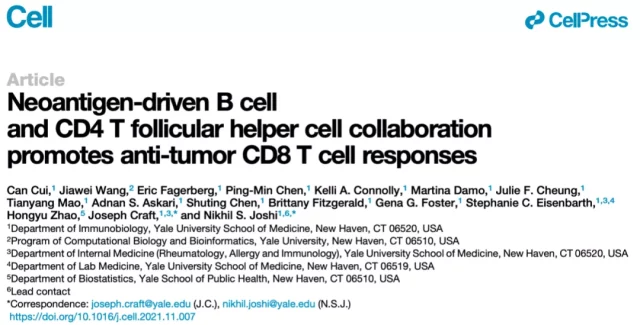
▲ Screenshot of the paper’s homepage
Lung cancer is one of the tumors with the highest mortality rate, and lung adenocarcinoma is the most common subtype of lung cancer.
The emergence of immune checkpoint inhibitors has changed the current status of lung cancer treatment, however, only 20% of lung adenocarcinoma patients can benefit from it [2].
To further improve the response rate of treatment, we need to have a deeper understanding of the immune cells infiltrated by tumors.
In order to understand which immune cells are infiltrated in lung adenocarcinoma, the researchers first analyzed the TCGA database and found that a variety of immune cells were enriched in lung adenocarcinoma tissue .
In our traditional impression, the infiltration of CD8 T cells and myeloid cells (such as macrophages) in the tumor is expected.
Surprisingly, however, the enrichment of B cells and CD4 T cells in these samples was even more significant .
The analysis of single-cell sequencing data further confirmed this finding. Specifically, the enrichment of Tfh in germinal center (GC) B cells and CD4 T cells is the most prominent .
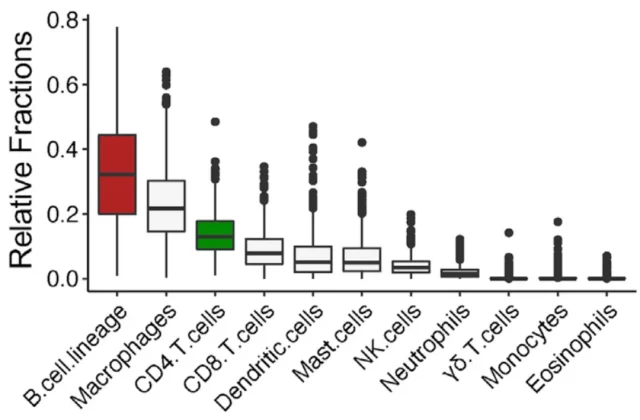
▲ The estimated score of immune cell infiltration in lung adenocarcinoma samples (CIBERSORT algorithm)
GC B cells and Tfh cells play an important role in CP in humoral immunity. Why do they come to the tumor immunity this time?
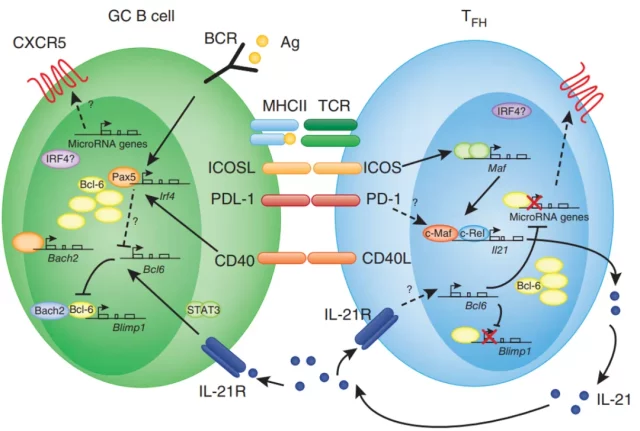
▲ Interaction between GC B cells and Tfh cells [3]
Researchers found that patients with high GC B cell and Tfh cell scores have a better survival rate .
The scores of GC B cells and Tfh cells are positively correlated with the scores of Th1 and CD8 effector T cells, which suggests that GC B cells and Tfh cells may Play the role of promoting anti-tumor immune response in lung cancer .
Next, the researchers used the mouse model to dig deeper into the mechanism.
The researchers constructed a mouse lung adenocarcinoma subcutaneously transplanted tumor model called KP-HELLO.
In this model, tumor cells express the B cell recognition antigen HEL, and the T cell recognition antigens GP33–43 and GP61–80 .
At the same time, the researchers used the KP-NINJA model that does not express HEL antigen but expresses GP33–43 and GP61–80 as a control.
Flow cytometry found that compared to the KP-NINJA model, KP-HELLO can effectively induce tumor-specific Tfh cell and GC B cell responses, suggesting that B cell recognition of antigen plays an important role in this process .
Compared with wild-type mice, the growth of KP-HELLO tumors in mice deficient in B cells or Tfh cells was significantly enhanced, while the growth of KP-NINJA tumors was not affected, indicating that the response of Tfh cells and GC B cells is inhibiting KP -HELLO plays an important role in the growth of tumors .

▲ In mice deficient in Tfh cells (CD4-Cre Bcl6fl/fl) or B cells (uMT), the growth of KP-HELLO tumors was significantly enhanced
When it comes to suppressing tumors, everyone first thought that it might be CD8 T cells.
Sure enough, when Tfh cells or GC B cells are defective, the effector function of CD8 T cells will be significantly weakened .
So, how do Tfh cells and GC B cells enhance the anti-tumor function of CD8 T cells?
The researchers concluded that the cytokine IL-21 may have played a key role in this process. IL-21 is a landmark cytokine secreted by Tfh cells.
Previous studies have shown that IL-21 can enhance the effector function of CD8 T cells [4].
Sure enough, the researchers found that there are a large number of Tfh cells expressing IL-21 in KP-HELLO tumors. In B-cell deficient mice, IL-21+ T cells were significantly reduced.
In addition, IL-21+ T cells in KP-NINJA tumors are also significantly lower than KP-HELLO tumors. This indicates that the IL-21 signal of Tfh cells in tumors requires the participation of B cells and B cells to recognize antigens .
Furthermore, the researchers found that activated CD8 effector T cells express IL-21 receptor (IL21R) on the surface .
After knocking out IL21R, the infiltrating CD8 effector T cells in the tumor were significantly reduced, and tumor growth was also significantly enhanced.
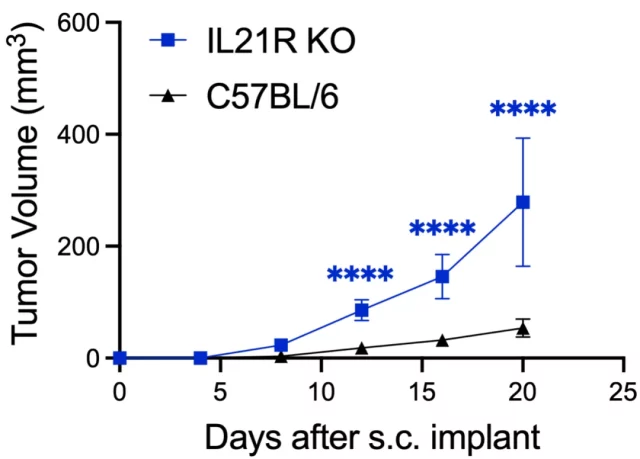
▲After knocking out IL21R, tumor growth was significantly enhanced
The study of the mechanism has become clearer so far. In order to make the story more rigorous, the researchers have further explored the role of the interaction between Tfh and B cells in inducing anti-tumor immune responses.
Previous studies have known that mice lacking CD40/CD40L and lacking ICOS/ICOSL cannot form GC B cells or mature Tfh cells due to the defective ability of T cells and B cells to help each other [5].
In this study, researchers found that defects in ICOS or CD40L can cause KP-HELLO tumors to grow faster . In addition, in KP-HELLO tumor mice deficient in Tfh cells, the response of GC B cells was significantly reduced; while in KP-HELLO tumor mice deficient in B cells, or in KP-NINJA tumor mice, the response of Tfh cells Also significantly reduced.
In these cases, the function of CD8 T cells is also significantly weakened, but infusion of tumor antigen-specific CD4 T cells can reverse these phenotypes.
These results indicate that the interaction between Tfh and B cells plays an important role in inducing anti-tumor immune responses, but the presence of tumor-specific Tfh cells is sufficient to enhance the effector function of tumor-infiltrating CD8 T cells .
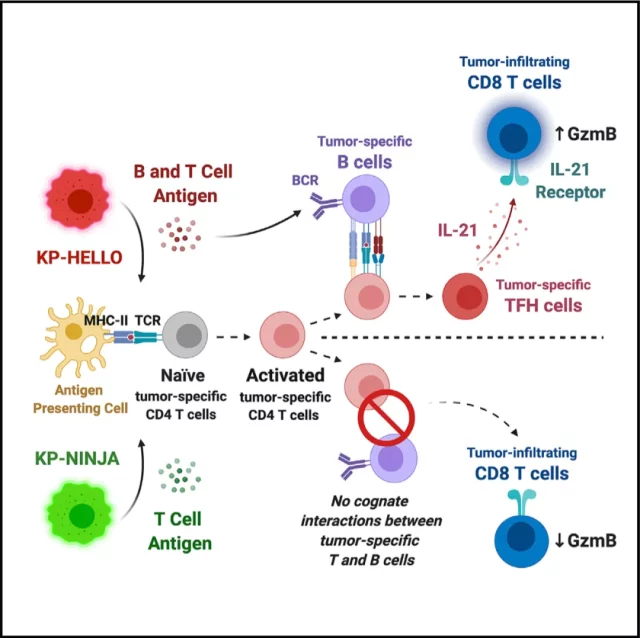
▲ Mechanism summary diagram
In summary, this study found that the interaction between tumor-specific CD4 T cells and B cells can induce the production of tumor-specific Tfh cells.
Tfh cells can secrete IL-21 to enhance the anti-tumor effect of CD8 T cells. Role .
This discovery refreshes our understanding of CP on GC B cells and Tfh cells, and may open new ideas for tumor immunotherapy.
references
1.Cui C, Wang J, Fagerberg E, Chen PM, Connolly KA, Damo M, Cheung JF, Mao T, Askari AS, Chen S et al: Neoantigen-driven B cell and CD4 T follicular helper cell collaboration promotes anti-tumor CD8 T cell responses. Cell 2021.
2.Herbst RS, Giaccone G, de Marinis F, Reinmuth N, Vergnenegre A, Barrios CH, Morise M, Felip E, Andric Z, Geater S et al: Atezolizumab for First-Line Treatment of PD-L1-Selected Patients with NSCLC. N Engl J Med 2020, 383(14):1328-1339.
3.Nutt SL, Tarlinton DM: Germinal center B and follicular helper T cells: siblings, cousins or just good friends? Nature Immunology 2011, 12(6):472-477.
4.Zander R, Schauder D, Xin G, Nguyen C, Wu XP, Zajac A, Cui WG: CD4(+) T Cell Help Is Required for the Formation of a Cytolytic CD8(+) T Cell Subset that Protects against Chronic Infection and Cancer. Immunity 2019, 51(6):1028-+.
5.Crotty S: T Follicular Helper Cell Biology: A Decade of Discovery and Diseases. Immunity 2019, 50(5):1132-1148.
B cells and CD4+ T cells join forces to activate killer T cells
(source:internet, reference only)
Disclaimer of medicaltrend.org
Important Note: The information provided is for informational purposes only and should not be considered as medical advice.



